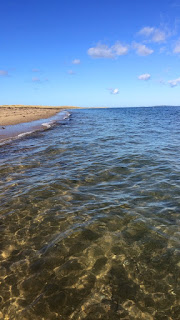Behind me I could hear and smell Sunday morning getting started in the summer rentals along the beach. Voices of families planning the day echoed over the smell of bacon and toast as the morning dog walkers, joggers and paddleboarders made their way into the heat and humidity before it got too uncomfortable. Over the beach an ultralight under a red canopy buzzed back and forth.
Across the river in front of me a few schoolies were ambushing bait where the river proper poured itself into a shallow-bottomed creek. They were well out of casting range but I had timed it this way hoping that when the tide turned in a half hour the change in the direction of the river and the push of water out of that creek would deposit the action directly in front of me.
I started blind casting while I waited out the tide, weighing the pros and cons of adding another payment “app” to my fly business. I had spent the previous morning at the bank dealing with the pleasantries of one of my accounts being breached. I remember a time when things of this nature were treated as a major event worthy of investigation and reprisal. Now it seems they are as trivial as getting an oil change or a haircut. I guess I’m showing my age, but the idea of putting my financial information out there in another area of the soulless faceless wireless world was not something that excited me. Recently, I had conversation with a good friend and customer about this. He happens to be from an “older school” than I am but he’s hipper to the “new” ways. He basically told me “you’ve got to adapt to survive.” Great. More usernames and passwords to remember.
An osprey appeared from upriver and began circling the mouth of the creek at about two hundred feet. I’ve become obsessed this summer with watching two pair of these birds and their fledglings who nest near some of my favorite spots. Also known as fish hawks, river hawks or sea hawks, they are amazing to watch and listen to. Like many other species, the osprey was seriously threatened by the effects of DDT and other pesticides in the mid 1900’s. With the ban of these pesticides and other chemicals in the early 1970’s, at least here in the US, the osprey population has rebounded significantly. The osprey is one species that has adapted to survive, commonly nesting, brooding and raising fledglings on the edges of and within waterfront communities, marinas and urban sprawl. Another reminder that the world continues to get to smaller as society grows larger. I wonder how much more the planet can adapt to survive humankind.
I watched the osprey circle above as I listened to the drone of the ultralight behind us and wondered what the bird thought of it. Has it accepted and adapted to our intrusion into its airspace or does it think “…like, WTF?” Ironically a party barge happened to be passing by while I contemplated the osprey’s thoughts. There were five children and four adults aboard and all of them, other than the driver of the boat were staring into their devices and tapping away. I thought of the contrast between them and the adult osprey I had watched the previous weekend flying with its two young in and out of their nest and over the marsh communicating in whistles and chirps, fully immersed in the teaching of self-reliance. Yea. I’m pretty sure the osprey watches us in disbelief.
Suddenly the osprey dropped straight down on the schoolies rolling bait across the river, flared itself to an almost complete stop just above the water before dropping its talons in the water and coming out with a small striper. The bird flew back upriver as I stood there humbled, and, honestly, breathless from what I had just experienced. The timing of the cast and the placement of the fly, particularly when sight fishing a topwater feed, is the difference between “fishing” and “catching.” At that moment it seemed a small feat to master in comparison to what the osprey had just pulled off.
I continued to cast as the tide turned but kept watch for my osprey friend eager to see a repeat performance. As I had predicted, bait began to stack along the grass edge in front of me and it wasn’t long before I had a few follows and a short hit. I opted to change to a smaller fly. The smaller fly didn’t receive any attention, so I went back to the larger pattern and bit off part of the tail and wing to shorten it. A few casts later the line went tight and as I stripped a small schoolie to hand I heard the high-pitched whistle of the osprey as it flew past me. I watched in fascination as it pulled another fish out from along the bank just downriver from me. I released my fish as the osprey flew past me close enough that even with my restricted vision, I thought we made eye contact. For a split second I saw the bird silent and motionless, caught in the balance of its vulnerability to an environment constantly altered and consumed by another species and its innate proficiency at surviving by taking only what it needs from what is available. The silence was broken by an email alert on my phone and I instantly knew the osprey will continue to adapt and survive long after we’re gone.
South River, MA
28 July 2019











